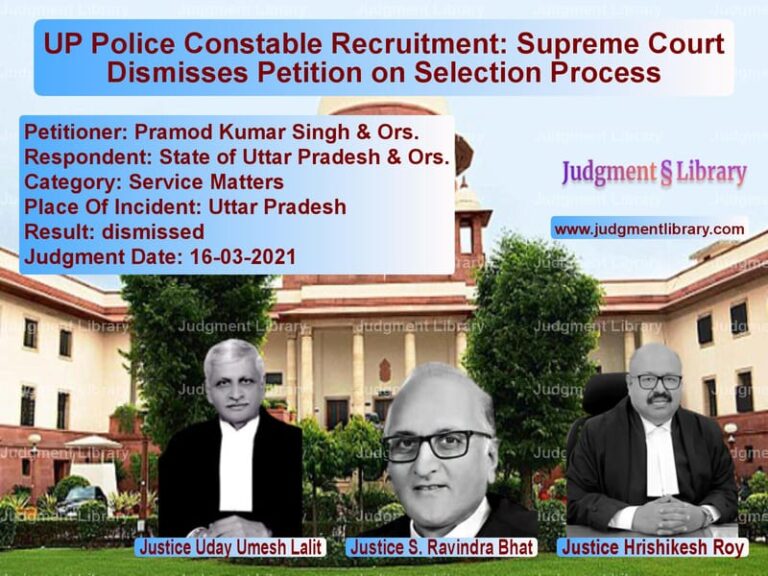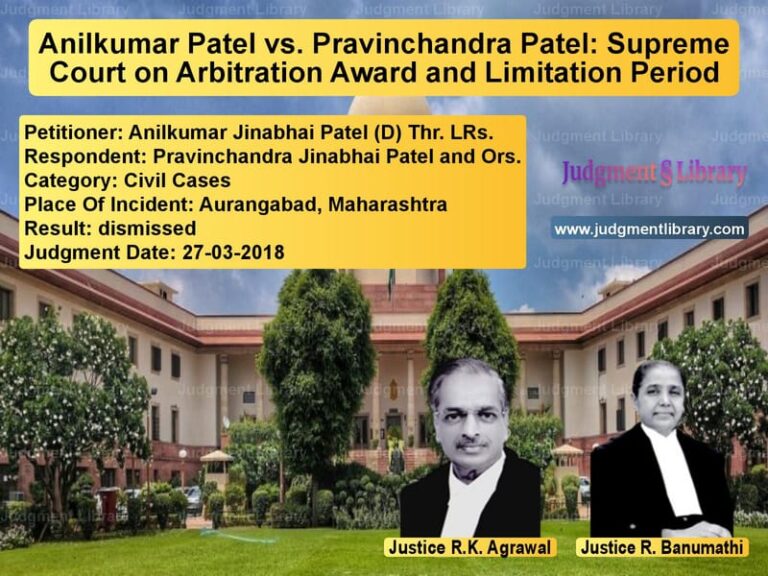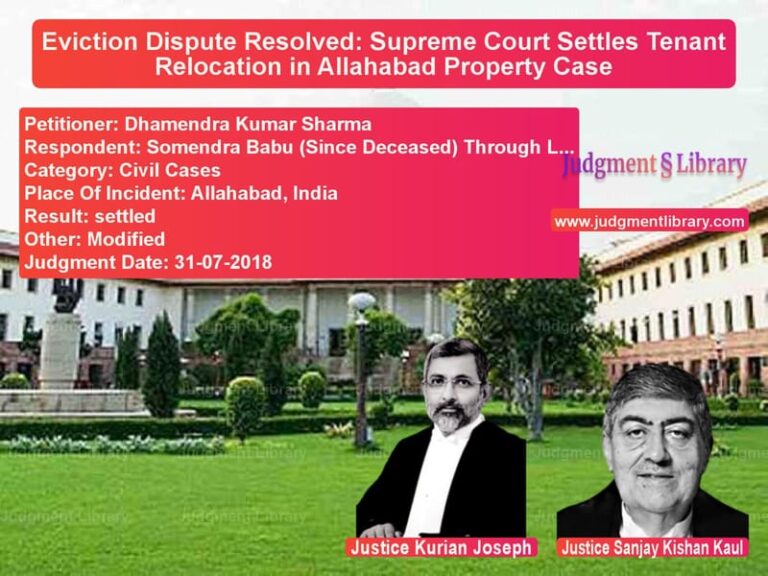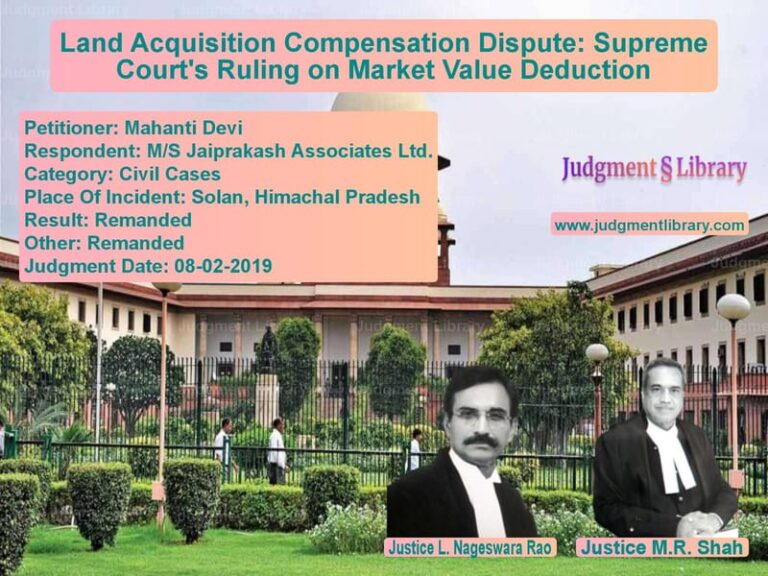Akhil Gogoi Bail Case: Supreme Court Ruling on UAPA, NIA Investigation, and Personal Liberty
The case of Akhil Gogoi v. The State (National Investigation Agency) has raised significant questions regarding personal liberty, the application of the Unlawful Activities (Prevention) Act (UAPA), and the scope of judicial intervention in cases concerning political activism. The Supreme Court, in its ruling, addressed the key issues of preventive detention, procedural fairness, and the necessity of balancing national security concerns with fundamental rights under Article 21 of the Indian Constitution.
Background of the Case
Akhil Gogoi, a well-known activist and sitting Member of the Assam Legislative Assembly, was arrested on 17 December 2019 in connection with protests against the Citizenship (Amendment) Act, 2019. The charges against him included sedition under Sections 120B (criminal conspiracy), 124A (sedition), 153A (promoting enmity between groups), and 153B (imputations prejudicial to national integration) of the Indian Penal Code (IPC), along with Sections 18 and 39 of the UAPA.
The case was initially registered as Chanmari Case No. 1688/2019 but was later taken over by the National Investigation Agency (NIA), re-registered as RC-13/2019/NIA-GUW. Gogoi spent 567 days in custody before being discharged by the Special NIA Court on 1 July 2021. However, the Gauhati High Court overturned his discharge on 9 February 2023, reinstating the charges and prompting Gogoi to approach the Supreme Court.
Petitioner’s Arguments
Senior Advocate Huzefa Ahmadi, appearing for Gogoi, presented the following key arguments:
- The petitioner had already suffered 18.5 months of incarceration before being discharged by the Special NIA Court.
- The charges under UAPA were based on alleged Maoist links dating back to 2009, with no direct connection to the current protests.
- The protests against the Citizenship (Amendment) Act were part of democratic dissent and did not constitute a terrorist act.
- During the 21 months of freedom following his discharge, Gogoi had not engaged in any unlawful activity.
- The case was politically motivated, aimed at suppressing legitimate dissent.
Respondent’s Arguments
Solicitor General Tushar Mehta, representing the NIA, countered with the following points:
- Gogoi was a leader of a terrorist organization who incited and trained youth to engage in violent activities.
- The petitioner was named in 64 FIRs, showing a pattern of unlawful activities.
- The initial rejection of bail by the Special NIA Court, the Gauhati High Court, and the Supreme Court indicated the seriousness of the charges.
- The petitioner’s discharge was based on procedural errors and did not exonerate him from the charges.
- The re-arrest of Gogoi was necessary to ensure he faced trial under UAPA provisions.
Key Legal Issues
The Supreme Court examined the following crucial legal questions:
- Does the reversal of a discharge order automatically mandate re-arrest?
- Is preventive detention justified in cases where the accused has already spent significant time in custody?
- Can protest activities be classified as acts of terrorism under UAPA?
- What role does past incarceration play in determining the need for further detention?
Supreme Court’s Observations
The Supreme Court ruled in favor of Gogoi, emphasizing the following key points:
- “The petitioner has already suffered 567 days in custody, exceeding half of the maximum punishment prescribed for IPC offenses.”
- “The High Court’s ruling only reinstated charges and did not necessitate immediate re-arrest.”
- “Since his release, the petitioner has not engaged in any unlawful activity or actions prejudicial to national security.”
- “Preventive detention should be an exception, not the norm, particularly in cases involving political dissent.”
The Court also noted that the case involved a broader question about the treatment of activists under UAPA and how legal provisions should be interpreted in light of fundamental rights.
Final Judgment
The Supreme Court confirmed the Gauhati High Court’s order reinstating charges but granted bail to Gogoi pending trial. The case was remanded to the Special NIA Court to determine whether charges should be framed under UAPA or IPC.
The Court stated:
“The petitioner is entitled to be protected against arrest and detention in connection with FIR No. RC-13/2019/NIA-GUW. He shall be released on bail, subject to conditions imposed by the Special NIA Court.”
Impact and Legal Significance
This ruling establishes key precedents on:
- Judicial oversight of preventive detention: Courts must scrutinize detention under UAPA to prevent its misuse.
- The balance between national security and personal liberty: Political protests cannot be arbitrarily classified as terrorism.
- The necessity of procedural fairness: The Supreme Court emphasized that procedural lapses should not override fundamental rights.
Conclusion
The Supreme Court’s ruling in Akhil Gogoi v. The State (NIA) reaffirms the principle that legal proceedings must be conducted in a manner that upholds constitutional rights. The decision provides clarity on the application of UAPA, ensuring that its provisions are not misused to suppress political dissent. The ruling further strengthens the right to bail in cases where prolonged detention serves no purpose.
Petitioner Name: Akhil Gogoi.Respondent Name: The State (National Investigation Agency) & Ors..Judgment By: Justice V. Ramasubramanian, Justice Pankaj Mithal.Place Of Incident: Assam.Judgment Date: 18-04-2023.
Don’t miss out on the full details! Download the complete judgment in PDF format below and gain valuable insights instantly!
Download Judgment: akhil-gogoi-vs-the-state-(national-supreme-court-of-india-judgment-dated-18-04-2023.pdf
Directly Download Judgment: Directly download this Judgment
See all petitions in Bail and Anticipatory Bail
See all petitions in Fundamental Rights
See all petitions in Terrorist Activities
See all petitions in Judgment by V. Ramasubramanian
See all petitions in Judgment by Pankaj Mithal
See all petitions in allowed
See all petitions in Remanded
See all petitions in supreme court of India judgments April 2023
See all petitions in 2023 judgments
See all posts in Criminal Cases Category
See all allowed petitions in Criminal Cases Category
See all Dismissed petitions in Criminal Cases Category
See all partially allowed petitions in Criminal Cases Category







